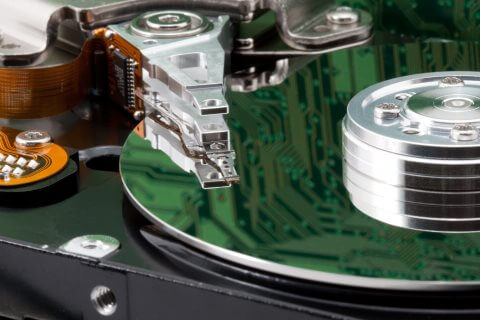You’ve dropped your external hard drive, and you’re worried that it might not work anymore. Now what?
If the drive contains absolutely essential data, the best practice is to leave it powered off. Get it to a data recovery company and explain the situation; they’ll be able to evaluate the drive without risking platter damage, ensuring that you’ll be able to get a full recovery of the contents.
With that said, if you’re reading this article, you probably didn’t do that — you tried to start the drive, at which point you realized that your data was inaccessible. In that case, you probably encountered one of the following scenarios:
The drive “beeps.” A beeping sound usually comes from the spindle motor hub. The hard drive’s electronics aren’t able to provide enough power to the spindle to spin the platters. This can occur due to electronic issues, but it’s more commonly associated with a spindle failure. Essentially, the spindle is “locked up,” so it’s not able to run at its normal speed.
That’s a problem, since hard drives need to maintain a certain amount of speed in order to keep their read/write heads from coming into contact with their platters (the part of the drive that stores your data). If you hear a beep, we strongly recommend turning the drive off. Do not attempt to recover your own data. An engineer will need to repair or replace the spindle in order to copy the data off of the drive.
The drive “clicks.” This can occur when the hard drive’s actuator arm hits a limiter, which prevents them from going too far in one direction. If you’re hearing a persistent clicking sound, the drive’s heads are having trouble finding your data.
Again, this is a serious sign of a physical hard drive failure. It’s possible that the read/write heads are in contact with the platters, and they could remove the magnetic material that stores your data. Unplug the drive immediately and contact a data recovery professional.
The drive “whirrs.” A whirring sound can also indicate a spindle or head failure. It could mean that the read/write heads are in direct contact with the platters, which is obviously bad news. To put it simply: If you’re hearing any sort of unusual sounds from a dropped external hard drive, turn it off immediately. It’s past the point of home repair.
The drive doesn’t seem to turn on at all. It’s possible (if unlikely) that the electronic component of your hard drive was damaged. It’s more likely that the drive has sustained physical damage, and it’s simply unable to boot as a result.
If you’re absolutely sure that your hard drive won’t boot at all, you can remove it from its external enclosure — taking care to properly ground yourself before touching it — and try to hook it up to a desktop computer. If you’re lucky, it’ll boot up, at which point you can access the data, provided that the external drive’s electronics weren’t serving some essential function (for instance, disabling encryption). In most cases, opening the drive’s external enclosure will void your product warranty, so you might want to enlist the help of a data recovery provider anyways.
At Datarecovery.com, we operate fully outfitted laboratories at each of our locations, staffed with experienced engineers who can treat any type of hard drive failure. If you’ve dropped your external hard drive, contact us at 1-800-237-4200 to discuss the situation and obtain a free estimate.






